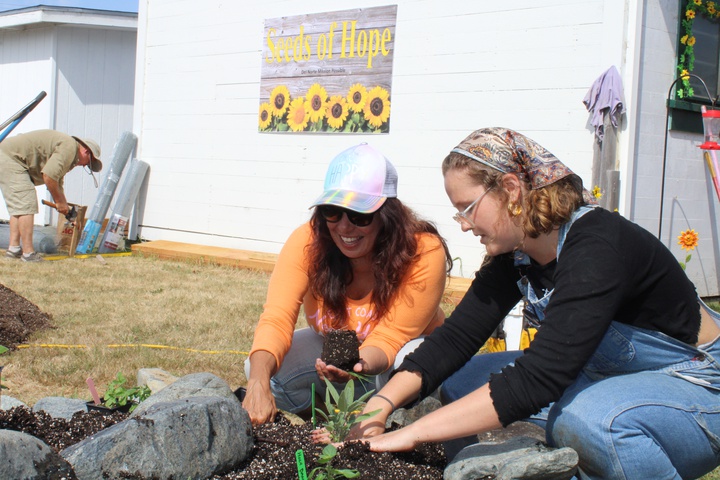Jessica Cejnar / Monday, Aug. 17, 2020 @ 3:52 p.m. / Community
(Updated) Working Toward A Full-time Shelter, DN Mission Possible Starts Small With Women's Transitional Housing Program

Del Norte Mission Possible director Daphne Cortese-Lambert plants a garlic chive start in The Mission Possible Home's new spiral herb garden Sunday. Photo: Jessica Cejnar
Previously:
• Assemblyman Wood Honors Del Norte Mission Possible As His Nonprofit of the Year
• DN Mission Possible Teams Up With Local Motel, County, Seven Angels to Offer Free Showers
• New Nonprofit Pursues 24-Hour Rescue Mission
###
(Editor's note: Story has been corrected to include the name of Good Earth Organics, of Cave Junction, which donated soil to the Mission Possible Home.)
“Put your finger in the bottom of the pot and move those roots around,” master gardener Terry Allaway instructed volunteers from two blossoming organizations and one that’s thriving. “You’re releasing them and saying, ‘Hey, grow.’”
One hand cupping a garlic chive start, the other gently hollowing out a repository for the tiny plant, Daphne Cortese-Lambert grinned as Alloway listed the herbs that would inhabit the spiral of rocks and soil at the new Mission Possible Home.
Sweet marjoram, holy basil and garden sage fragrances mingled with the scent of fresh earth warmed by the sun peaking out from the coastal fog on Sunday. Cortese-Lambert, her clients at Mission Possible Home, a program to help women transition from homelessness to permanent housing, and volunteers with the Wild Rivers Permaculture Guild and True North Organizing Network spent the morning building and preparing raised beds for beans, cucumbers, strawberries and other plants.
Cortese-Lambert, director of Del Norte Mission Possible, founded Mission Possible Home for women, especially those at risk for serious illness from COVID-19, who needed a safe place to stay.
With help from First Baptist Church, which donated a house at 1100 H Street, Mission Possible Home opened its doors in July and is currently housing two clients. It has enough beds for five women, but, Cortese-Lambert said, she’s starting small.
“A huge component of this house is that women are motivated to change,” she told the Wild Rivers Outpost. “My desire is to start small, but long-range. And long-range is three months to me. In about three months, I would think we would know how to use healthy food and be able to distribute some of that to the homeless community.”
The Mission Possible Home is a smaller-scale version of Del Norte Mission Possible’s ultimate project — to transition the Our Daily Bread building at 1135 Harrold Street in Crescent City from an emergency shelter to a full-time rescue mission with 52 beds.
Cortese-Lambert and the Del Norte Mission Possible Board of Directors met for the first time in November 2019.
Women involved in The Mission Possible Home contribute to the upkeep of the household, cooking, cleaning, gardening as well as planning activities and healthy meals. According to Cortese-Lambert, her clients’ goal is to find permanent housing and obtain the skills to sustain that housing.
The women must agree to put 60 percent of their money into savings and participate in a case management system, Cortese-Lambert said.
“I don’t have them agree to it right then,” she said. “I tell them I’d like them to think about it and I’d like them to write something down that says why do they think the program is good for them and what kind of additions do they think they can bring to the house. That lets me know if someone’s motivated or not.”
During their stay at The Mission Possible Home, the clients learn budgeting and other life skills. They work with the Del Norte Social Services and Behavioral Health branches, Open Door Clinic, Sutter Coast Hospital and the U.S. Department of Housing and Urban Development, according to an organization news release.
If they’re making progress, but after three months can’t find permanent housing, Cortese-Lambert said she’ll extend their stay at The Mission Possible Home.
“I would hope people in the community would give them a chance,” she said. “I’m hoping to make personal links with people that own homes so they will give my ladies a chance.”
Though she’s involved in The Mission Possible Home, Cortese-Lambert said she’s still working on overhauling the Our Daily Bread building. She said she’s waiting on state dollars from the local Continuum of Care and plans to use those dollars to make sure the building is properly ventilated by the time inclement weather sets in.
“I am continuing to learn how I can make that program successful and what the community needs,” Cortese-Lambert said.
For the Wild Rivers Permaculture Guild, the garden at The Mission Possible Home is the first community services project its members have lent their skills to, Allaway told the Outpost. Since its inception in January 2019, guild members have held monthly and bimonthly work parties.
“This is the first one done for someone not in the guild,” Allaway said. “I think it’s turning out very well.”
Fellow permaculture guild member, David Salmon, said The Mission Possible Home garden is a way for the guild to further its mission of urging people to grow their own food.
“We are willing to help anybody in Del Norte or Curry County who wants to learn about permaculture,” he said.
Dar Caldwell, of the Family Resource Center of the Redwoods helped design The Mission Possible Home’s space. Vegetable starts were donated from Elkhorn Herbals and permaculture guild members. The soil came from Good Earth Organics Inc. in Cave Junction and Ace Hardware donated the wood for the raised beds, according to Cortese-Lambert.
For more information about the Wild Rivers Permaculture Guild, visit its Facebook page or email wildriverspermacultureguild@gmail.com.
For more information about volunteering for The Mission Possible Home, call Cortese-Lambert at (707) 954-7319.
CLICK TO MANAGE